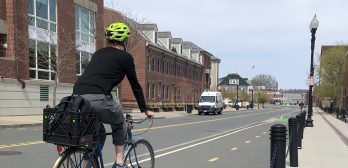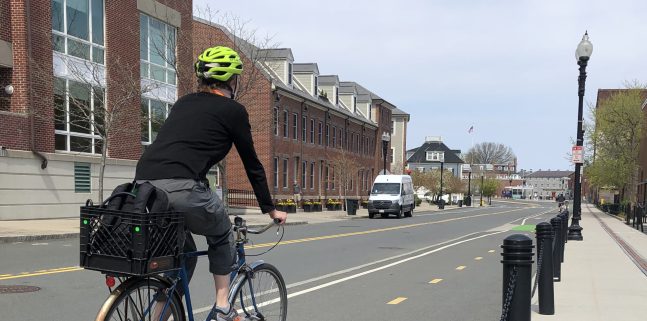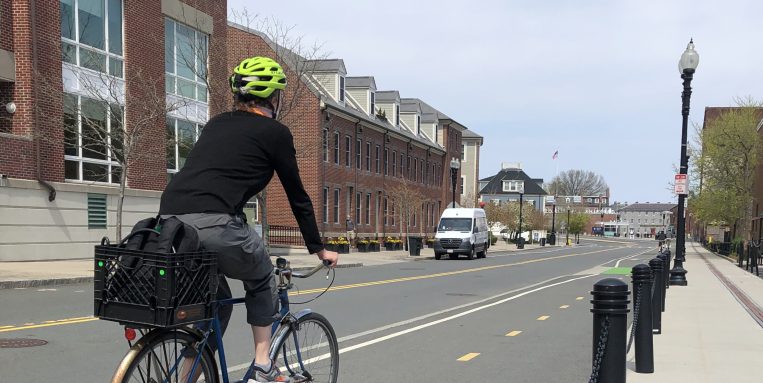On Thursday June 17, Nitsch Engineering hosted our third virtual Client Seminar, Streets that Work for People: Multimodal & Green Streets Post Pandemic. Multimodal and green streets have been important trends in transportation for years now. But the COVID-19 pandemic has increased the public’s demand for user-friendly outdoor space – and that includes how people are using roadway infrastructure and community open spaces.
From newly separated bike lanes, to redesigned shared roadways that improve safety and calm traffic, to more green and open space, the pandemic gave communities the opportunity to ramp up planned improvements and to take advantage of reduced traffic conflicts to pilot different solutions. And we can’t forget that the pandemic changed how we communicate, particularly when it comes to public engagement. Will these trends continue to grow in the future?
In this panel conversation, attendees heard from three municipalities about what the application of complete streets elements has looked like over the past year … and how they envision multi-modal and green streets will move forward as we continue to shift into post-pandemic life.
Biking in Boston: 2020 Work and Trends
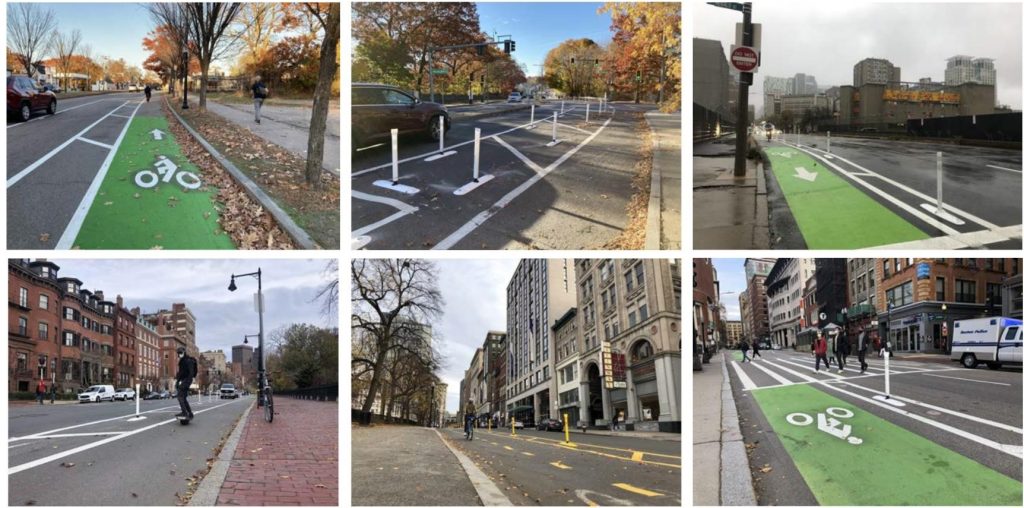
 Stefanie Seskin, Active Transportation Director for the Boston Transportation Department (BTD), began by discussing Vision Zero, an initiative set forth by the BTD to eliminate serious and fatal injuries that result from traffic crashes and overall transform the approach to streets in the City of Boston. Stefanie provided a detailed explanation of Vision Zero and its goals, described how the initiative has already been applied to City streets (along with data to support their findings), and discussed the role the pandemic has played in altering the BTD’s approach and implementation of Vision Zero – particularly when it comes to public engagement. Stefanie also identified the next steps that will be taken to achieve the goal of significantly reducing traffic injuries/fatalities and improving safety for all City residents.
Stefanie Seskin, Active Transportation Director for the Boston Transportation Department (BTD), began by discussing Vision Zero, an initiative set forth by the BTD to eliminate serious and fatal injuries that result from traffic crashes and overall transform the approach to streets in the City of Boston. Stefanie provided a detailed explanation of Vision Zero and its goals, described how the initiative has already been applied to City streets (along with data to support their findings), and discussed the role the pandemic has played in altering the BTD’s approach and implementation of Vision Zero – particularly when it comes to public engagement. Stefanie also identified the next steps that will be taken to achieve the goal of significantly reducing traffic injuries/fatalities and improving safety for all City residents.
Improving Safety on Bedford Road in Carlisle, MA
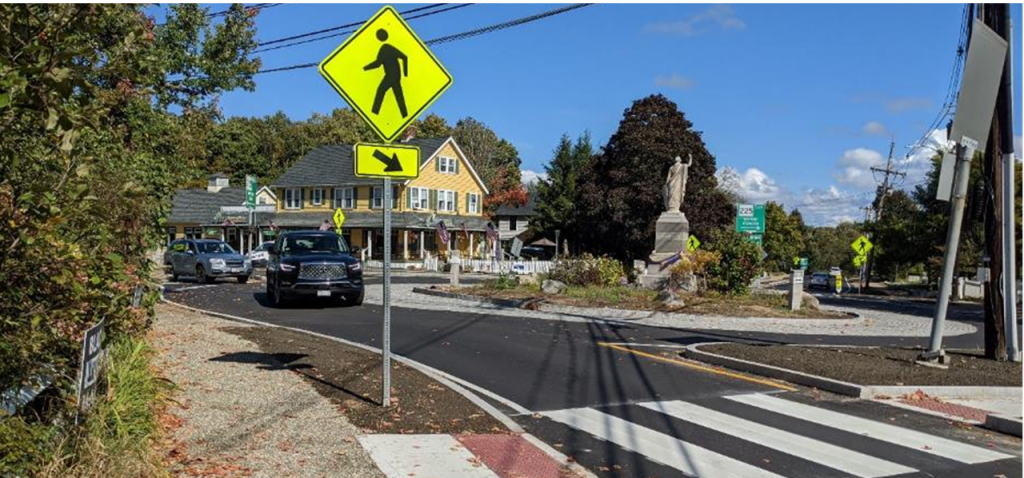
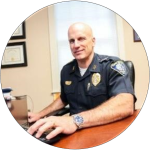 John Fisher, Chief of Police of the Carlisle Police Department, then discussed the Town of Carlisle’s application of complete streets on Bedford Road, the surrounding area, and the existing roundabout. Chief Fisher provided a complete background and rundown of the project, from concept through construction. His presentation ended with an explanation of how implementing complete streets (and specifically this project) has enhanced traffic and pedestrian safety for the Town of Carlisle community.
John Fisher, Chief of Police of the Carlisle Police Department, then discussed the Town of Carlisle’s application of complete streets on Bedford Road, the surrounding area, and the existing roundabout. Chief Fisher provided a complete background and rundown of the project, from concept through construction. His presentation ended with an explanation of how implementing complete streets (and specifically this project) has enhanced traffic and pedestrian safety for the Town of Carlisle community.
Expanding Walkability and Open Space in Weston, MA
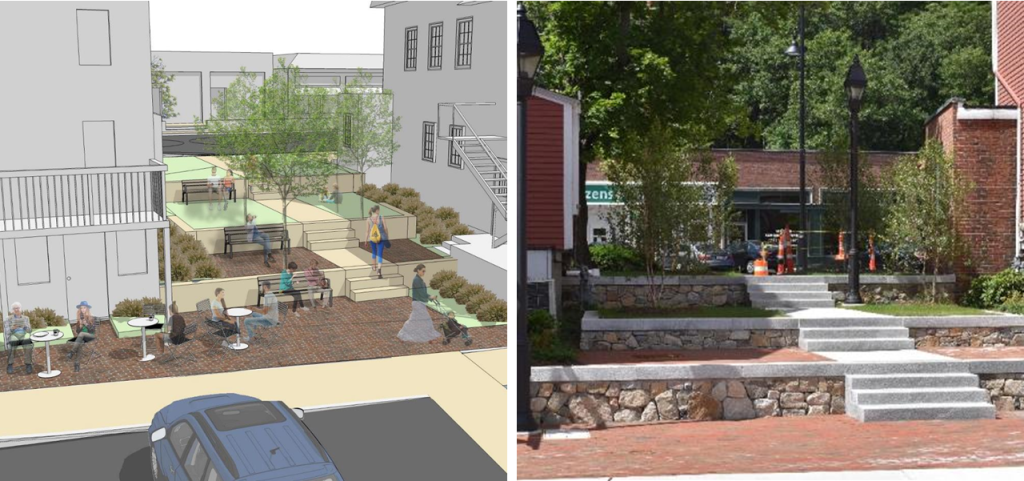
 Stephen Larocque, Chair of the Weston Town Center Planning Committee and President of Larocque Architecture & Planning P.C., concluded the seminar by discussing the Weston Town Center Improvement project. Stephen shared a thorough background of this project, identifying the major challenges affecting the area prior to the project’s proposed traffic calming and safety improvements. These improvements included the construction of accessible sidewalks and roadway crossings, the burial of overhead utilities, and the creation of three new public green spaces within the Town Center. Stephen ended by discussing the final steps that will be taken as construction wraps up this summer, illustrating how this project will create a safer, more accessible Town Center for Weston residents to enjoy.
Stephen Larocque, Chair of the Weston Town Center Planning Committee and President of Larocque Architecture & Planning P.C., concluded the seminar by discussing the Weston Town Center Improvement project. Stephen shared a thorough background of this project, identifying the major challenges affecting the area prior to the project’s proposed traffic calming and safety improvements. These improvements included the construction of accessible sidewalks and roadway crossings, the burial of overhead utilities, and the creation of three new public green spaces within the Town Center. Stephen ended by discussing the final steps that will be taken as construction wraps up this summer, illustrating how this project will create a safer, more accessible Town Center for Weston residents to enjoy.
Want to talk more about complete streets?
 Reach out to Deputy Director of Transportation Engineering, John Michalak, PE, ENV SP, to learn more!
Reach out to Deputy Director of Transportation Engineering, John Michalak, PE, ENV SP, to learn more!

